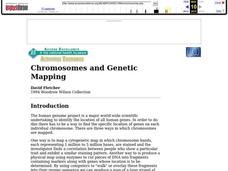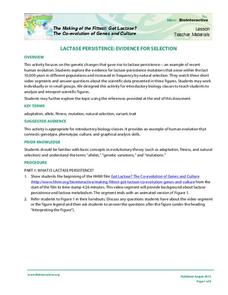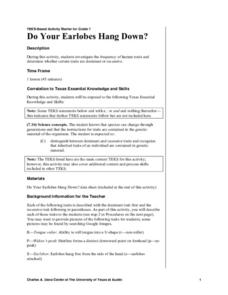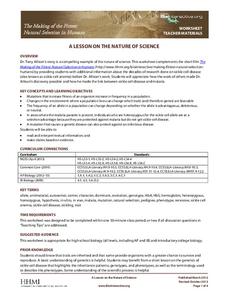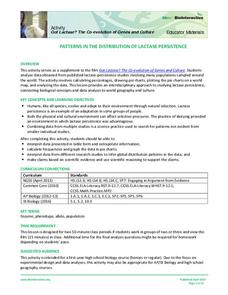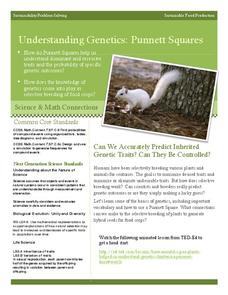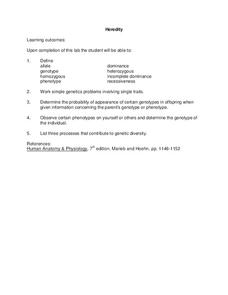Curated OER
Inherited Traits
Students work with a partner to complete an inventory of their traits and compare and discuss their unique qualities. In this biology lesson, students determine percentages for the frequency of observed traits of classmates, compile the...
Science Friday
Colorful Chromosomes
Everything is in the genes. Individuals observe 14 different traits of themselves. Using pipe cleaners and beads, the learners create models of a chromosome representing their traits. The class then compares and contrasts everyone's...
Howard Hughes Medical Institute
How Novel Icefish Genes Can Improve Human Health
Designed to accompany the 13-minute video The Making of the Fittest: The Birth and Death of Genes, this handout serves as both a viewing guide during the video and an analysis of how the adaptations of the icefish might help treat some...
LABScI
Genetic Equilibrium: Human Diversity
Investigate the Hardy-Weinberg Principle to explain genetic equilibrium. The 10th lesson plan of a series of 12 is a laboratory exploration of genetic equilibrium. Your classes use a mixture of beans to model allele and genotype...
Howard Hughes Medical Institute
Understanding Variation
Does where we live influence how our bodies express genetic traits? Explore variation in human skin color with an activity that incorporate video and hands-on learning. Individuals model the relationship between phenotypes and genotypes,...
Howard Hughes Medical Institute
Zebrafish and Skin Color
You may not know if that zebrafish in your fish tank is a model citizen—but it is definitely a model organism! What can we learn about ourselves from a tiny zebrafish? Discover more about the polygenic trait of skin color through a...
Howard Hughes Medical Institute
Developing an Explanation for Mouse Fur Color
Whether or not you think mice are nice, you'll love the colorful activity! Scholars examine evidence for evolution in the rock pocket mouse through video, discussion, and collaborative work. Learners watch a video regarding variation in...
Curated OER
Genetics Practice 1: Basic Mendelian Genetics
Six genetics problems are to be solved by junior geneticists. Empty Punnett squares are provided for them to plant the parents' alleles and determine the genotype, phenotype, and frequency of offspring. All of the problems involve actual...
Curated OER
Chromosomes and Genetic Mapping
Learners are introduced to mapping by crossover frequency. Genes travel as packaged trains on chromosomes. They use this experiment, genetic mapping assignment, that allow students to quickly complete the assignment and yet examine the...
Howard Hughes Medical Institute
Lactase Persistence: Evidence for Selection
What's the link between lactase persistence and dairy farming? Biology scholars analyze data to find evidence of the connection, then relate this to human adaptation. Working individually and in small groups, learners view short video...
Curated OER
Do Your Earlobes Hang down?
Seventh graders listen as the teacher explains the differences between dominant and recessive traits. The data sheet is described and delivered to students. Students collect data about themselves and record it on their sheet. For the...
Curated OER
Beauty: Patterns in Nature
Students explore the patterns of nature. In this interdisciplinary lesson, students examine beauty in nature and participate in a hands-on simulation that demonstrates how human preferences for beauty have led to an increased frequency...
Howard Hughes Medical Institute
A Lesson on the Nature of Science
If you are looking for a great way to present natural selection in humans, look no further. This handout is intended to accompany the 14-minute video The Making of the Fittest: Natural Selection in Humans, which can be found on the...
Howard Hughes Medical Institute
Patterns in the Distribution of Lactase Persistence
We all drink milk as babies, so why can't we all drink it as adults? Examine the trend in lactase production on the world-wide scale as science scholars analyze and interpret data. Groups create pie charts from the data, place them on a...
Curated OER
Chromosomes and Genetic Mapping
Students create models of chromosomes using clay, coins, beads, or marbles. They complete a worksheet regarding their crossover frequencies they created with their chromosomes and gene models. They read an essay on sex chromosomes and...
National Center for Case Study Teaching in Science
In Sickness and in Health
Based on family history, how likely is it that a couple's children will have a recessive disease? In an in-depth, but easy-to-follow case study, future geneticists learn the story of Greg and Olga, who are hoping to have children, but...
Western Kentucky University
Understanding Genetics: Punnett Squares
Can scientists really predict genetic outcomes or are they simply making a lucky guess? Scholars first learn about Gregor Mendel and how to make Punnett squares. Then they extract DNA from a strawberry in a lab with included conclusion...
Curated OER
Recombination and Pedigrees
Biology aces answer four questions about genetic recombination and nine questions about pedigrees. This worksheet is very focused on these two topics. Most of the pedigree questions relate to the genetic disorders, Alkaptonuria and...
Curated OER
Patterns of Evolution and Selection
Can your young biologists interpret population graphs, match macroevolution patterns and descriptions, and answer multiple choice questions about evolution? Find out with a comprehensive three-page quiz covering some specific examples of...
Curated OER
Evolution
In this evolution worksheet students complete a crossword puzzle by answering questions about the environment, evolution and populations.
Curated OER
Heredity
In this science worksheet, students find the answers to various types of heredity problems. They use the sheet to set goals for completing the unit.
Center for Innovation in Engineering and Science Education, Stevens Institute of Technology
Ciese: Human Genetics Project: Is the Dominant Trait Most Prevalent?
Human-Genetics: A Worldwide Search for the Dominant Trait allows you to collect data and share your results with students around the world. Register your class, complete the student survey, participate in discussion boards, and interact...










